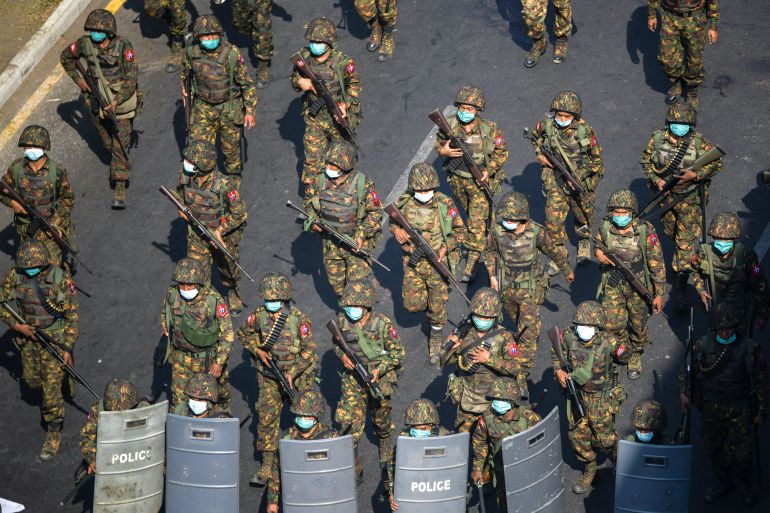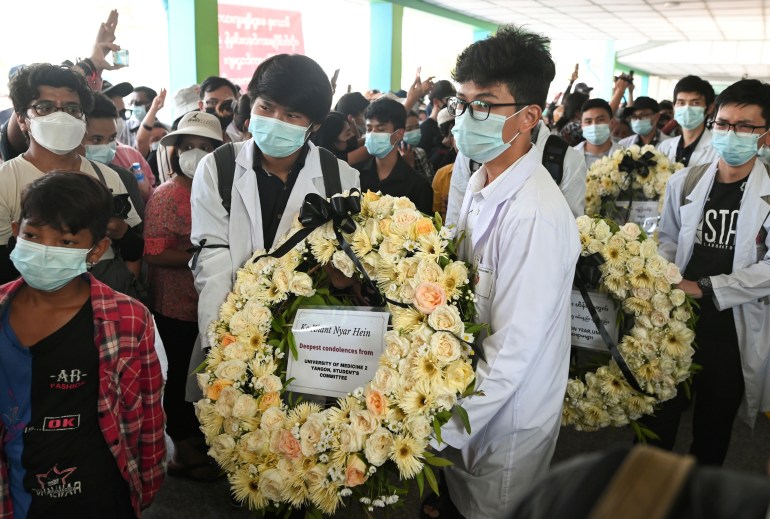US to blacklist two Myanmar military-linked conglomerates: Report
US Treasury to sanction the firms and freeze their assets in US after military coup and deadly crackdown.

The United States is planning to impose sanctions against two conglomerates controlled by Myanmar’s military over the generals’ February 1 coup and a deadly crackdown, two sources familiar with the matter told the Reuters news agency.
The move by the US Department of the Treasury to blacklist Myanmar Economic Corporation (MEC) and Myanmar Economic Holdings Ltd (MEHL) and freeze any assets they hold in the US could come as early as Thursday, the sources said.
Keep reading
list of 4 itemsWestern sanctions on China over Xinjiang trigger furious response
In Myanmar, rising food and fuel prices endanger the poor: UN
UN condemns Myanmar violence as US sanctions general’s children
The White House National Security Council referred inquiries to the Department of the Treasury, which did not immediately respond to requests by Reuters for comment.
Myanmar’s generals staged a takeover on the first day of parliament in February, detaining civilian leaders including Nobel laureate Aung San Suu Kyi, whose party won elections in November. The military claimed there was voter fraud but observers said there were no significant irregularities.
The coup sparked a widespread uprising, and security forces have responded with violence, killing at least 286 people, according to the Assistance Association for Political Prisoners, an advocacy group that is tracking detentions and deaths in Myanmar since the coup.

US President Joe Biden issued an executive order on February 11 paving the way for new sanctions against the Myanmar military and its interests. The order froze about $1bn in reserves Myanmar’s central bank was holding at the New York Federal Reserve, which the military government had attempted to withdraw after seizing power.
The US and the United Kingdom, as well as the European Union and Canada, have already imposed some sanctions against top generals including Commander in Chief Min Aung Hlaing and the chief’s adult children.
Tightening sanctions
But aside from three gemstone companies hit by US sanctions in February and the US Department of Commerce’s move to blacklist exports by the conglomerates, sanctions had until now not gone after the military’s business interests.
The latest US actions add to measures it imposed after Myanmar’s 2017 crackdown that prompted an exodus of more than 740,000 mostly Muslim Rohingya into neighbouring Bangladesh.
The military controls vast swathes of Myanmar’s economy through the holding firms and their subsidiaries, with interests ranging from beer and cigarettes to telecommunications, tyres, mining and real estate.
Activists have been calling for international sanctions to starve the military of revenue and want governments to go further and hit oil and gas projects that are a chief source of funding to Myanmar.

The Ministry of Defence established MEHL in April 1990 to “provide for the economic welfare for soldiers, war veterans, and the Burmese people, as well as to support the economic development of the state.”
The company “epitomizes the reach and breadth of the military’s domination over Burma’s economy,” the US Embassy said in a cable back in 2009 that recommended sanctions on MEHL, all its wholly-owned units, board members and general managers. “Its influence and holdings are key components of the elaborate system of patronage the regime uses to maintain power.”
Analysts say the military’s business clout remains significant even with democratic reforms of the past 10 years, and that the coup could be seen as an attempt to protect the military’s wealth and interests from potential reforms by the civilian government.
The United Nations Fact-Finding Mission, set up in the wake of the Rohingya crackdown, detailed the military’s business interests in a 110-page report that was published in August 2019.
The report laid bare the extent of the armed forces’ involvement in the economy – exposing 106 MEHL and MEC-owned businesses as well as 27 close affiliates to the military – and the armed forces’ domination of Myanmar’s natural resources, including jade mining.
In 2019, the NLD managed to secure civilian control of the general administrative department, which oversees key bureaucratic appointments, and had also introduced changes to the law on gemstones and jade.